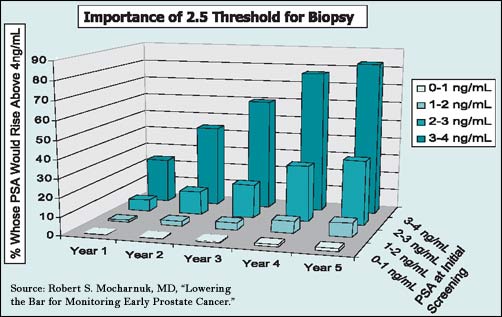Importance of PSA 2.5 Threshold for Biopsy
“In men with a PSA of 2.5-4, it appears that putting off a biopsy is not only postponing
the inevitable, but is allowing cancer to grow when it could be taken care of in an earlier and
more curable stage.
William J. Catalona, MD

Baseline or initial PSA values were recorded for 32,241 men. 31,303 (92%) had a baseline PSA of less than 4ng/ml.
One purpose of the study (Crawford, U. of Colorado) was to see how many of these men, and in what time frame, would their PSA rise to above 4. PSA above 4ng/ml is the traditional indicator for biopsy and a warning for prostate cancer).
The data shows that of men with a PSA between 2 and 3, more than 30% had a PSA above 4ng/ml and at year 5, it was nearly 35%.
The data for men with a PSA between 3 and 4 is even more foreboding.
By year 2, the alarm bells are really going off and 44% of the men have a PSA over 4.
By year 5, the sirens are blaring: 83% of the men have a PSA over 4.
Dr. Catalonas own study enrolled 36,000 men for screening and lasted for 12 years.
After just a few years, it became apparent that nearly half of the men whose PSA was in the 2.5 to 4 range progressed to PSA levels above 4 within four years.
In nearly one-third of these men with rapidly rising PSA, the cancer had spread to the margins of the prostate or beyond by the time a biopsy was performed for a PSA of 4 or above.
Dr. Catalona thought, Whats the point of waiting for a biopsy until a PSA of 4 with men who have a PSA of over 2.5? A good majority is going to get to 4 and above in a few short years.
He and his research colleagues reported their findings in 2003 in the New England Journal of Medicine along with the recommendation that PSA 2.5 be the threshold for a biopsy.
Currently, the American Cancer Society and the 2004 National Comprehensive Cancer Center Network guidelines recommend consideration of a biopsy for a PSA above 2.5.











